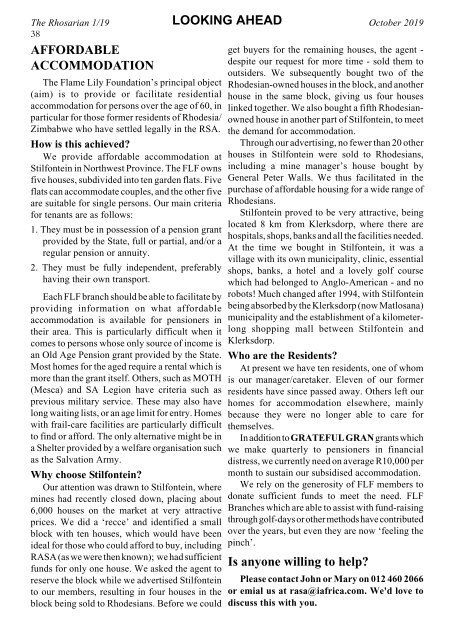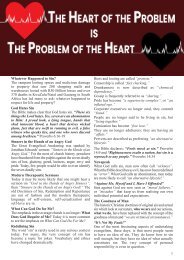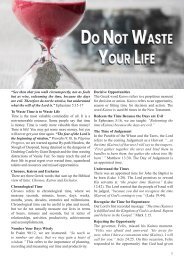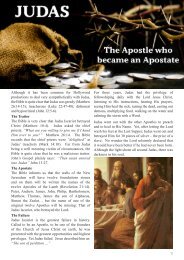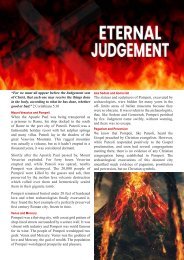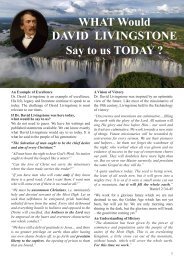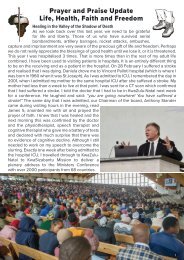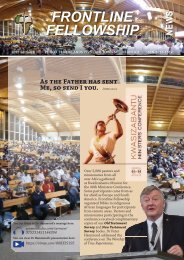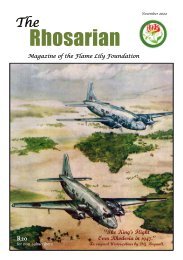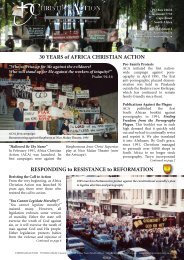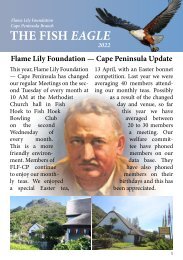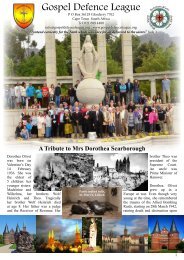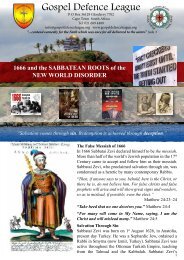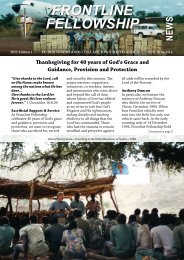Rhosarian 2019
You also want an ePaper? Increase the reach of your titles
YUMPU automatically turns print PDFs into web optimized ePapers that Google loves.
The <strong>Rhosarian</strong> 1/19<br />
deliberately did not charge for overhead costs, nor<br />
did we look for any payment for management,<br />
either for myself or for our black managers. We<br />
grew a good crop for them; which gave them a<br />
gross margin of over Z$350 million, which in<br />
2003 was a substantial amount of money. We had<br />
kept our toe in the door, but they had<br />
simultaneously put their foot in and were using<br />
the agreement to play for time. They did not<br />
occupy our house. They bought only a minimal<br />
amount of their own equipment and did no capital<br />
development at all, although that had been required<br />
under their offer letter.<br />
Scene 9<br />
They then reneged on the terms of our<br />
agreement and in September 2003 told us to get<br />
out of the house and off the farm. They gave us 48<br />
hours to pack up both farm houses (our own house<br />
and that of our grandson Nicholas). They refused<br />
to allow me or any of my family onto the farm to<br />
pack up, so my secretary and our two black<br />
managers had to do it all. In the haste a number of<br />
documents were damaged or lost. I was glad that<br />
Wendy was away in Australia and did not have to<br />
go through that traumatic experience. We later<br />
managed to get agreement that we could continue<br />
farming our side of the farm, and I travelled out on<br />
most days from Harare. But we still had the<br />
Section 8 hanging over us, under which we could<br />
still be displaced, invaded or kicked out at any<br />
time.<br />
During those first twelve months the situation<br />
had gradually become more difficult, as the<br />
occupants intruded more and more on to our side<br />
of the farm. They were supposed, under the A2<br />
scheme, either to live on the farm and run it<br />
themselves, or to employ a manager. ...<br />
Labour Legislation<br />
In addition to all these problems, labour<br />
legislation made farmers pay a very substantial<br />
redundancy package to workers who had<br />
previously been permanently employed and who<br />
now had to leave because of the farm take-overs.<br />
This package included items such as outstanding<br />
leave pay, transportation to their homes, and one<br />
month’s pay for every six months worked,<br />
calculated at current wage rates with no ceiling.<br />
People who had worked for us for many years had<br />
LOOKING BACK<br />
October <strong>2019</strong><br />
37<br />
enormous gratuities, far more than they could have<br />
expected, and this was on top of the normal pension<br />
scheme to which we had been contributing for<br />
them for many years. After we made these<br />
redundancy payments we still continued to employ<br />
those workers who wished to stay on, but under a<br />
new contract. ... On some farms the packages were<br />
so crippling that farmers were unable to pay them<br />
even after selling their assets. We had to payout<br />
over Z$75 million in 2003 and 2004, at that time an<br />
enormous amount of money. ...<br />
Failure to Implement<br />
In May 2003, the President appointed a<br />
commission to advise government on land<br />
settlement and to plan the future. In fact, it was<br />
nothing more than a delaying tactic. Headed by Dr<br />
Charles Utete, who, for many years had been the<br />
Chief Secretary to the President and Cabinet, it had<br />
some good men on it, though I would have preferred<br />
fewer academics and more practitioners. ...<br />
The Utete Commission did a thorough job and<br />
exposed many people who were supposed to have<br />
only one farm but had grabbed up to half a dozen.<br />
They compiled a list of existing farmers who were<br />
prepared to subdivide and co-exist and who were<br />
working as far as possible on the original formula<br />
- one farmer, one farm - within the maximum<br />
hectarage allowed for that Natural Region.<br />
We had two meetings with this task force,<br />
constructive, congenial and forward-looking, and<br />
they quickly realized the deficiencies of our two<br />
occupants.<br />
When they finished their report at the end of<br />
2003, they presented it to the President, who<br />
accepted it. It was put to the Politburo and Central<br />
Committee of ZANU(PF) and eventually to<br />
Parliament, all of whom accepted its<br />
recommendations, though few were implemented.<br />
The Final Blow<br />
By 2004, I was living in Harare, so unsettled<br />
and threatening had the situation become. Then we<br />
were struck another blow, Wendy, my wife of 58<br />
years, died on 20 January 2005. A few days later<br />
the gates to Mount Lothian, the farm were finally<br />
closed. I was warned by the Judge and the Retired<br />
Colonel of violence should I attempt to get back<br />
onto the farm.<br />
(See MSASA MAIL pp 9-11)


